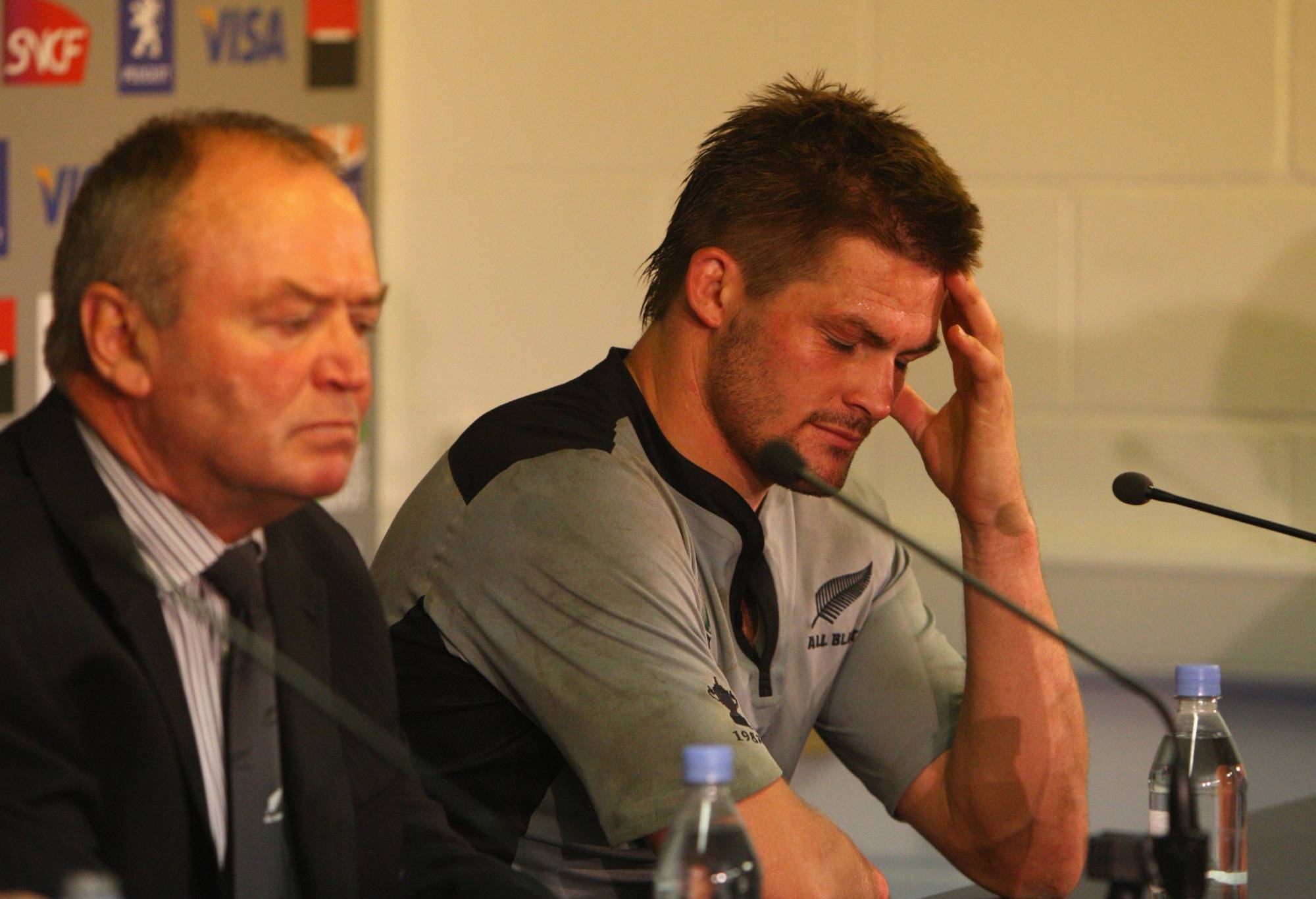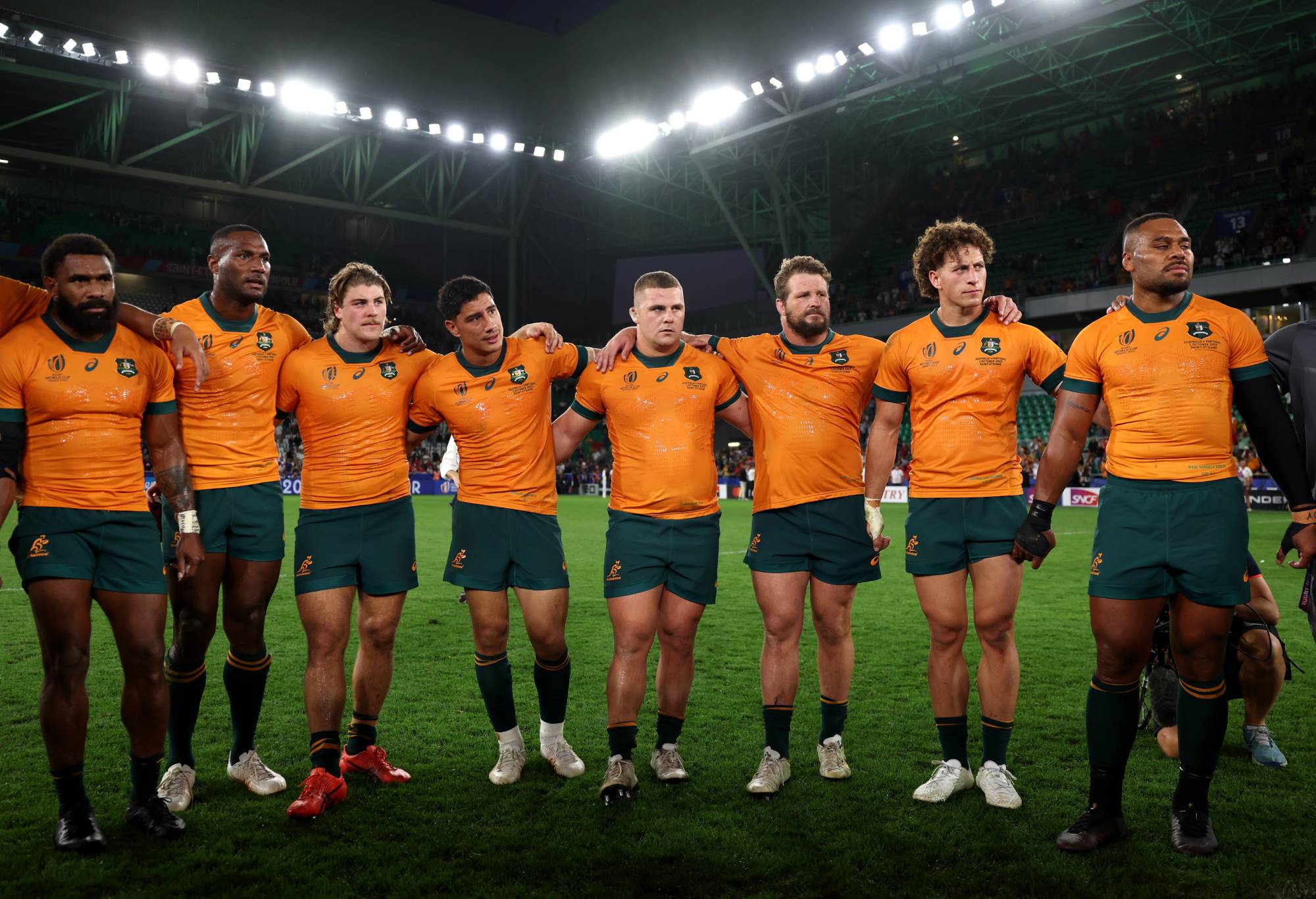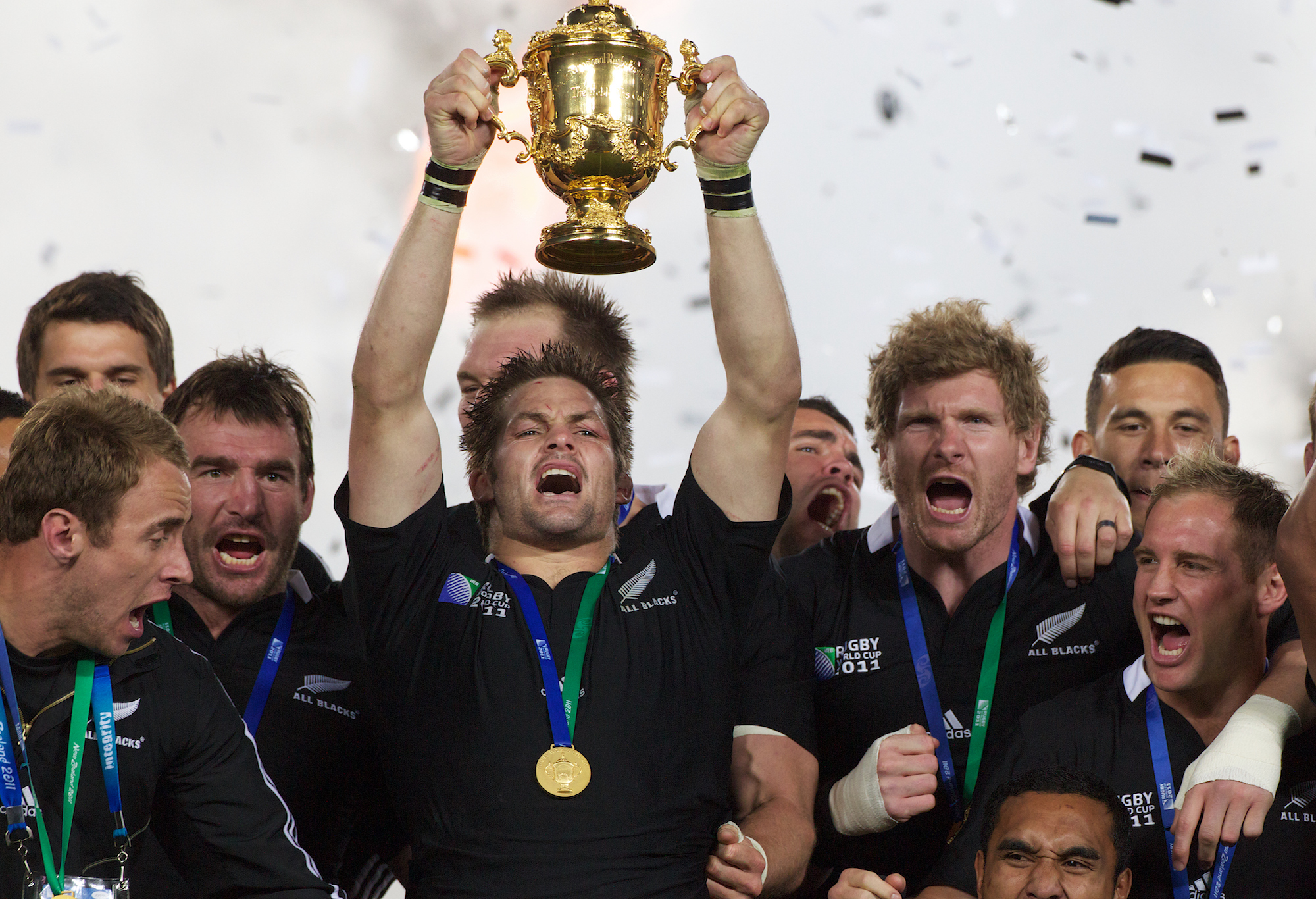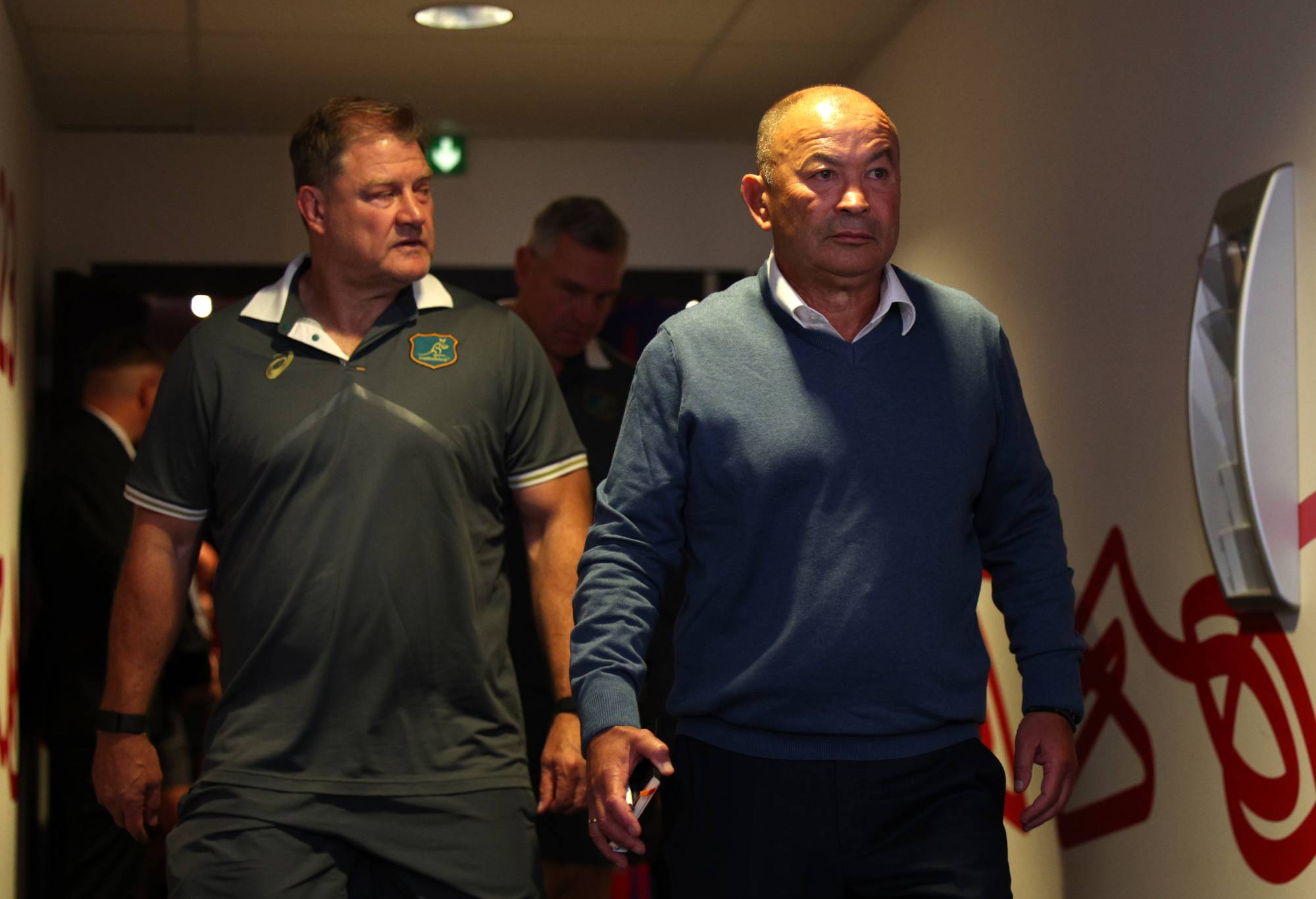Richie McCaw has cautioned Rugby Australia not to throw the toys out of the cot and says learning from their mistakes will be essential for the Wallabies to re-emerge as a powerhouse.
The two-time World Cup-winning All Blacks captain cautioned the playing group against feeling pity on themselves and urged them to use the painful experience to grow so they can succeed in four years’ time.
McCaw knows what it feels like to have bombed out at a World Cup.
After being in the infancy of his career for the 2003 tournament, McCaw led the All Blacks to France in 2007 with the expectation that the inaugural champions would break their two-decade drought.
They didn’t, as the All Blacks crashed out in controversial circumstances to Les Bleus in the quarter-finals – their worst result at a World Cup.
Everyone throughout New Zealand called for the heads of the administration, the coaching staff and McCaw as captain. McCaw admits to wanting to bury his head in the sand following the disastrous early exit.

New Zealand Rugby didn’t move away from Graham Henry and Richie McCaw despite their 2007 World Cup flop. (Photo by Stu Forster/Getty Images)
The opposite however occurred, as the New Zealand Rugby got tighter and looked inwards rather than blowing everything up and starting again.
It saw the governing body back Graham Henry’s coaching staff, which included Steve Hansen and Wayne Smith, as well as their under-siege captain.
Speaking with The Roar at the launch of NZR+’s new documentary Rivals Les Bleus featuring McCaw and former French captain Thierry Dusautoir, the former All Blacks skipper said it was essential RA looked at themselves before making any drastic changes.
“The reality is when it’s happened, you can’t change that. The worst thing you could do is not figure out why you’ve ended up in this situation as you did or have some lessons that came out of it and not learn them,” McCaw said.
“I guess that’s the big thing in ’07. Probably as a player, we all went home with excuses and all sorts of reasons why we weren’t successful but, at the end of the day, you’ve got to look at what we got wrong. We might have had some other influences that didn’t help, but we didn’t get it right.
“First of all, we were lucky enough as coaches and as a captain, and a few senior players to get another crack at being back in the team, and we said the biggest mistake we can make now is not learn from that experience. That’s what sort of set the path for the next eight years because that hurt and disappointment burned pretty deep and I didn’t want that to happen again.
“If you use it in the right way, now that it’s happened, you hopefully look back one day as a positive.
“Just going and completely changing, well, the next people aren’t going to learn those lessons because it wasn’t their gig.
“So, you’ve got to balance that I think. It’s one of the things the All Blacks perhaps learned from ’99-03, and they did that [make sweeping changes] and it didn’t help.
“So talking about the Wallabies, I don’t know the answer because I’m not close enough to that. There’s certainly some things they’ll need to acknowledge whoever is the coach going forward that you’d say that, ‘well, we don’t want to let that happen again.’”

Richie McCaw says the Wallabies playing group but look at themselves instead of blaming others. (Photo by Chris Hyde/Getty Images)
RA’s administration and Wallabies coach Eddie Jones are under fire to keep their jobs following the side’s World Cup flop where they failed to get out of the pool stage for the first time.
Jones’ return came after RA, led by chairman Hamish McLennan, brutally farewelled Dave Rennie in mid-January.
But the veteran coach failed to turn the Wallabies around, with his side claiming just two of nine Tests.
Jones is now under serious pressure to keep his job after his decision to back youth backfired spectacularly. The tactics and his coaching staff appointments are other issues that led to the Wallabies’ terrible campaign.
Nor do those factors include the circus surrounding Jones’ link to taking over Jamie Joseph and returning to the Japan Rugby Football Union as head coach.
Jones will address the media on Tuesday morning AEDT, with the subject of his press conference unclear.
Some sources believe Jones will speak of the need for RA to move towards a centralised system and reform, with the 63-year-old telling journalists in France in his final interview before leaving the country that the Wallabies had fallen behind the leading back as a result of being stuck in their ways.
McCaw, who led the All Blacks to back-to-back World Cups in 2011 over France and in 2015 over the Wallabies, said it was vital that RA look to build its base in a similar way the NZR did following their 2007 disappointment.
“I think that’s where you talk to Wayne Smith when he was coaching, he knew all the school kids around the country who were playing well and understood who was coming through,” McCaw said.
“You look at the under 20s coach and I know Scott Robertson was like that, he coached the under-20s. He knew to get hold of those guys to give them encouragement, and I think it’s hugely critical.
“I guess in Australia, we haven’t got it quite as much [in New Zealand], but you’ve got competition from the AFL and NRL, they’ve got people there helping kids out. It would easy for them to go down that track, so you want to actually show them there’s a pathway and that the game of rugby is a great way to go and there’s people in charge of keeping an eye on what’s going on.”

Richie McCaw led the All Blacks to consecutive World Cups following their 2007 disappointment. (Photo by Tim Clayton/Corbis via Getty Images)
The Wallabies playing group are unlikely to return to their Super Rugby franchises for at least another month.
How they respond remains to be seen, with Jones saying the experience would be vital in their development – and a pivotal moment for the Wallabies – ahead of the 2027 home World Cup.
“I’m not worried about my career mate. It’s more about are we moving to a better position? And I think we are,” Jones said.
“The scoreboard doesn’t say that but I think we are and I’m sure most of the players would agree with that.
“Maybe not all of them, but I’m sure a majority of players would agree with that and that’s all we can do. So therefore I can not sit back comfortably and say I’ve done as good as I could – but I don’t feel any personal distress about it.
“This is part of the job and at some stage when you’re changing a team, someone has to endure this. Now it doesn’t need to be as bad as that because there’s a couple of games we should have won that we’ve lost and there are other games that we probably weren’t good enough to win.”

Eddie Jones’ future with Australian rugby is up for debate following the Wallabies’ World Cup flop. (Photo by Adam Pretty – World Rugby/World Rugby via Getty Images)
Michael Lynagh – the former Wallabies captain, who spearheaded their 1991 World Cup victory – however was not so confident that the players would bounce back.
“Australia really haven’t fired a shot at this World Cup and it’s really disappointing. I feel for the players. They’re not bad players and they’ve worked really hard but when they get out on the field it just doesn’t seem to click for them,” Lynagh told the BBC Rugby Union Daily podcast.
“I feel the way this has gone there’s going to be a few of them that might struggle to get over this experience. I hope not.”
McCaw said the Wallabies playing group had to appreciate the tournament for what it is and build from it.
“The first thing you’ve got to remember is because you’ve had a bad game or a bad patch doesn’t mean you’re a bad player. But if you sort of throw your hands in the air and go ‘oh poor me and it’s not my fault or do you start to believe that perhaps I’m not good enough’ well that’s not going to help,” McCaw told The Roar.
“You’ve actually got to go, the things I do well to get here haven’t gone away but there’s a whole lot of things I need to do better if I’m going to compete at the pointy end, which World Cups you don’t know whether you can handle it until you’re there.
“What I figured out, it’s not whether you’re fitter or faster, or if your skills when you’re better, it’s actually being able to execute the skills when it counts and you need a bunch of people with that sort of mentality and poise and control, and as much as you say we’ve talked about it, you’ve actually sometimes got to experience it and have a few setbacks to learn.
“And ‘07 wasn’t just because we decided we wanted to figure that out, we had a few ups and downs through that need period to try things and see what worked and what didn’t and more in the mental space and handling those situations as opposed to how we were playing, so that’s what I’d say to those guys.”
So, all hope isn’t lost?
“No, if you [think] that, well, we might as well all pack up and go home,” he said.
“You’ve got to have hope and I guess that comes from leadership at the top to give the people hope and the players hope and say there’s a way – and then it takes hard work, which is great.”
































































































